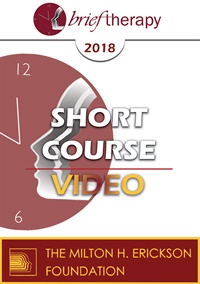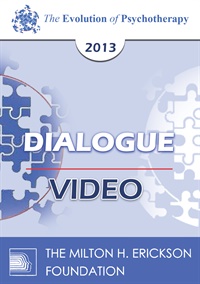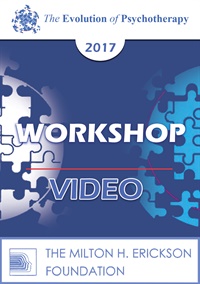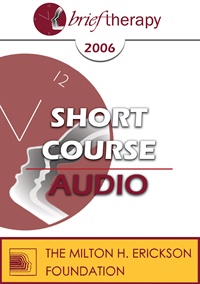
- Average Rating:
- Not yet rated
- Topic Areas:
- Short Courses | Borderline | Brief Therapy | Mind-Body | Neuroscience | Couples Therapy | Narcissism
- Categories:
- Brief Therapy Conference | Brief Therapy Conference 2006
- Faculty:
- Bruce Gregory, PhD
- Duration:
- 1:19:30
- Format:
- Audio Only
- Original Program Date:
- Dec 07, 2006
- Short Description:
- Dealing with narcissistic and borderline defenses that block healthy relating can be quite challenging when dealing with couples. This short course will address ways to creatively apply core aspects of Rossi's mind-body approach to develop treatment plans and interventions that can facilitate the containment of these defenses and help reorganize the dynamics of the couple system. The integration of the psychodynamic system and cognitive behavioral perspectives will be addresses throughout the course.
- Price:
- $15.00 - Base Price
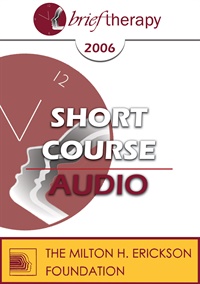
- Average Rating:
- Not yet rated
- Topic Areas:
- Short Courses | Borderline | Brief Therapy | Personality Disorders
- Categories:
- Brief Therapy Conference | Brief Therapy Conference 2006
- Faculty:
- Michael Munion, MA, LPC
- Duration:
- 1:18:42
- Format:
- Audio Only
- Original Program Date:
- Dec 07, 2006
- Short Description:
- This course examines the nature of Borderline Personality Disorder (BPD), and presents an integrated model of treatment of specific issues in brief, solution-focused episodes. Core elements of a safety plan and development of a community resource network are described. Careful management of the therapeutic relationship is a critical part of this approach. Some specific protocols for common BPD issues, such as suicidal ideation and self-injurious behaviors are elaborated.
- Price:
- $15.00 - Base Price
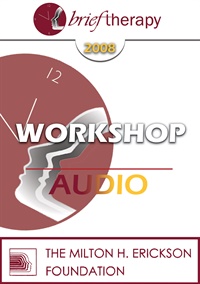
- Average Rating:
- Not yet rated
- Topic Areas:
- Workshops | Borderline | Brief Therapy | Personality Disorders | Solution Oriented Approach
- Categories:
- Brief Therapy Conference | Brief Therapy Conference 2008
- Faculty:
- Michael Munion, MA, LPC
- Duration:
- 2:28:27
- Format:
- Audio Only
- Original Program Date:
- Dec 11, 2008
- Short Description:
- This workshop examines the nature of Borderline Personality Disorder (BPD), and presents an integrated model of treatment of specific issues in brief, solution-focused episodes. Core elements of a safety plan and development of a community resource network are described. Careful management of the therapeutic relationship is a critical part of this approach. Some specific protocols for common BPD issues, such as suicidal ideation and self-injurious behaviors are elaborated.
- Price:
- $15.00 - Base Price
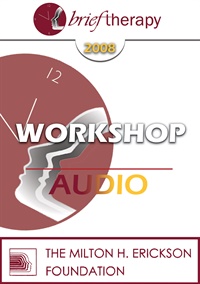
- Average Rating:
- Not yet rated
- Topic Areas:
- Workshops | Borderline | Brief Therapy | Personality Disorders
- Categories:
- Brief Therapy Conference | Brief Therapy Conference 2008
- Faculty:
- James Prochaska, PhD
- Duration:
- 2:41:36
- Format:
- Audio Only
- Original Program Date:
- Dec 12, 2008
- Short Description:
- Overcoming Chronic Problems involves progress through six stages of change: pre-contemplation, contemplation, preparation, action, maintenance and termination. Therapeutic principles and processes need to be matched to each stage of change. Innovative interventions for applying these principles and processes will be presented along with evidence and examples of how stage-matched therapy can outperform brief action-oriented therapies.
- Price:
- $15.00 - Base Price
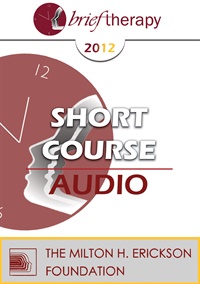
- Average Rating:
- Not yet rated
- Topic Areas:
- Short Courses | Borderline | Brief Therapy
- Categories:
- Brief Therapy Conference | Brief Therapy Conference 2012
- Faculty:
- John Lentz, D. Min.
- Duration:
- 1:29:05
- Format:
- Audio Only
- Original Program Date:
- Dec 09, 2012
- Short Description:
- BT12 Short Course 36 – New Perspectives and Healing for Borderlines: A Brief Therapy Intervention for Lasting Change – John Lentz, DMin This radical new approach for Borderline Personality Disorder utilizes strength based approaches that work, are respectful and brief. Combining clinical practice, communication theory and hypnotic principles this approach helps Borderlines feel safe and respected, while they change. Utilizing Borderline intuition, and insight it offers a way for them to gently alter their interpretations so that they can relate effectively and safely. You will like your new skills. This workshop comes from the author’s newest book.
- Price:
- $15.00 - Base Price
Tags: Borderline
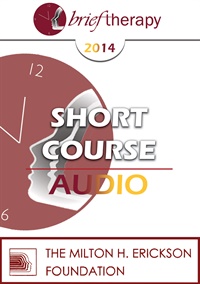
- Average Rating:
- Not yet rated
- Topic Areas:
- Short Courses | Borderline | Brief Therapy | Personality Disorders
- Categories:
- Brief Therapy Conference | Brief Therapy Conference 2014
- Faculty:
- Michael Munion, MA, LPC
- Duration:
- 1:30:14
- Format:
- Audio Only
- Original Program Date:
- Dec 11, 2014
- Short Description:
- This course examines the nature of Borderline Personality Disorder (BPD), and presents an integrated model for treatment of specific issues in brief, solution-focused episodes. Core elements of a safety plan and development of a community resource network are described. Careful management of the therapeutic relationship is a critical part of this approach. Some specific protocols for common BPD issues, such as suicidal ideation and self-injurious behaviors are elaborated.
- Price:
- $15.00 - Base Price
Credit available - Click Here for more information
- Average Rating:
- Not yet rated
- Topic Areas:
- Short Courses | Borderline | Brief Therapy | Personality Disorders
- Categories:
- Brief Therapy Conference | Brief Therapy Conference 2018 | Online Continuing Education
- Faculty:
- Michael Munion, MA, LPC
- Course Levels:
- Master Degree or Higher in Health-Related Field
- Duration:
- 1:29:43
- Format:
- Audio and Video
- Original Program Date:
- Dec 06, 2018
- Short Description:
- Brief Treatment with the Borderline Personality Disorder (BPD) patient makes no pretense at wholesale personality reconstruction, but rather considers the impact of the disorder on the therapy process in order to enhance the probability of success in successive brief episodes of care. This workshop reviews the etiology of BPD from both the Object Relations and the Psycho-social viewpoints. Specific protocols for dealing with issues such as Self-injurious behavior and Suicidal Ideation are reviewed.
- Price:
-
Sale is $29.00
price reduced from Base Price - $59.00
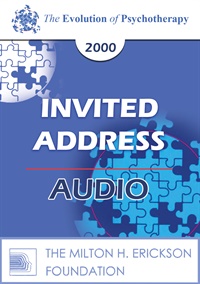
- Average Rating:
- Not yet rated
- Topic Areas:
- Psychotherapy | Invited Addresses | Borderline | Transference Focused Psychotherapy (TFP) | Transference / Countertransference
- Categories:
- Evolution of Psychotherapy | Evolution of Psychotherapy 2000
- Faculty:
- Otto Kernberg, MD | Aaron Beck, MD
- Duration:
- 1 Hour 28 Minutes
- Format:
- Audio Only
- Original Program Date:
- May 26, 2000
- Short Description:
- This presentation will summarize the strategy, tactics and techniques of TFP (Transference Focused Psychotherapy), its indications and contraindications, process and outcome studies of the Cornell University Personality Disorders Institute that developed this treatment over the past 15 years.
- Price:
- $15.00 - Base Price

- Average Rating:
- Not yet rated
- Topic Areas:
- Clinical Demonstrations | Borderline | Interviewing | Personality Disorders | Psychotherapy
- Categories:
- Evolution of Psychotherapy | Evolution of Psychotherapy 2009
- Faculty:
- Otto Kernberg, MD
- Duration:
- 52 Minutes
- Format:
- Audio Only
- Original Program Date:
- Dec 12, 2009
- Short Description:
- Educational Objectives: Given a patient, give an example of a structural interview. To describe how to test reality testing.
- Price:
- $15.00 - Base Price
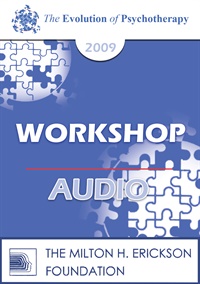
- Average Rating:
- Not yet rated
- Topic Areas:
- Psychotherapy | Workshops | Borderline | Transference Focused Psychotherapy (TFP) | Transference / Countertransference
- Categories:
- Evolution of Psychotherapy | Evolution of Psychotherapy 2009
- Faculty:
- Otto Kernberg, MD
- Duration:
- 2 Hours 32 Minutes
- Format:
- Audio Only
- Original Program Date:
- Dec 09, 2009
- Short Description:
- Dr. Kernberg will describe strategies, techniques and tactics in TFP beginning with diagnostic assessment and contracting.He will continue with main developments in transference and countertransference assessment and management. The concepts of technical neutrality and priorities of intervention will be outlined. Clinical examples will illustrate all these procedures.
- Price:
- $15.00 - Base Price
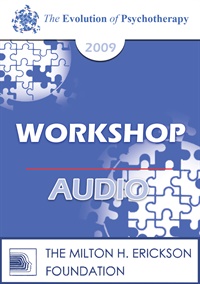
- Average Rating:
- Not yet rated
- Topic Areas:
- Workshops | Borderline | Psychotherapy | Transference Focused Psychotherapy (TFP)
- Categories:
- Evolution of Psychotherapy | Evolution of Psychotherapy 2009
- Faculty:
- Otto Kernberg, MD
- Duration:
- 2 Hours 27 Minutes
- Format:
- Audio Only
- Original Program Date:
- Dec 10, 2009
- Short Description:
- This workshop will focus on the complications in psychodynamic treatment with Transference Focused Psychotherapy. It will explore the management of suicidal and parasuicidal behavior, disruptive of the treatment, severe acting out in and outside the sessions, dishonesty, severe affect storms, and primitive forms of aggression. The treatment of trauma, paranoid regression, erotization, and secondary gain will complement this workshop.
- Price:
- $15.00 - Base Price
- Average Rating:
- Not yet rated
- Topic Areas:
- Dialogues | Personality Disorders | Borderline | Psychotherapy
- Categories:
- Evolution of Psychotherapy | Evolution of Psychotherapy 2013
- Faculty:
- Otto Kernberg, MD | Daniel Amen, MD | Dan Short, PhD
- Course Levels:
- Master Degree or Higher in Health-Related Field
- Duration:
- 1:04:24
- Format:
- Audio and Video
- Original Program Date:
- Dec 13, 2013
- Short Description:
- This session brings together neuroscience and psychotherapy to explore the inner world of borderline personality disorder. Through the lenses of brain imaging and transference-focused treatment, participants discover how early trauma, emotional intensity, and identity struggles shape behavior and relationships. The discussion offers an integrated view of biology and psychology, revealing how deeper understanding can foster healing and long-term change.
- Price:
-
Sale is $29.00
price reduced from Base Price - $59.00
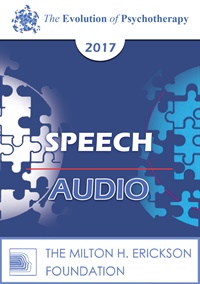
- Average Rating:
- Not yet rated
- Topic Areas:
- Speeches | Psychoanalysis | Personality Disorders | Transference Focused Psychotherapy (TFP) | Transference / Countertransference | Psychotherapy | Borderline | Schizophrenia
- Bundle(s):
- Learning Track - EP17 Psychoanalysis Download
- Categories:
- Evolution of Psychotherapy | Evolution of Psychotherapy 2017 | Evolution of Psychotherapy Psychoanalysis Learning Track
- Faculty:
- Otto Kernberg, MD
- Duration:
- 58:41
- Format:
- Audio Only
- Original Program Date:
- Dec 15, 2017
- Short Description:
- This presentation will differentiate the clinical characteristics and therapeutic management of several types of severely regressive transferences: typical split transferences of borderline patients, the fragmentation of affective experiences of schizoid personalities the intolerance of triangulation, and the narcissistic transferences. Clinical illustration will exemplify these differential transferences and their clinical management.
- Price:
- $15.00 - Base Price
Credit available - Click Here for more information
- Average Rating:
- Not yet rated
- Topic Areas:
- Workshops | Post-Traumatic Stress Disorder (PTSD) | Trauma | Storytelling | Constructive Narrative | Addiction | Abuse | Borderline | Psychotherapy
- Bundle(s):
- Learning Track - EP17 Trauma Stream
- Categories:
- Evolution of Psychotherapy | Evolution of Psychotherapy 2017 | Evolution of Psychotherapy Trauma Learning Track | Online Continuing Education
- Faculty:
- Donald Meichenbaum, PhD
- Course Levels:
- Master Degree or Higher in Health-Related Field
- Duration:
- 2:48:12
- Format:
- Audio and Video
- Original Program Date:
- Dec 13, 2017
- Short Description:
- Ways to implement the core tasks of psychotherapy with patients who evidence PTSD and co-morbid disorders of prolong and complicated grief, Substance Abuse Disorders and Borderline Personality Disorders. A case conceptualization model of risk and protective factors and incorporates a constructive narrator perspective will be presented.
- Price:
-
Sale is $29.00
price reduced from Base Price - $59.00
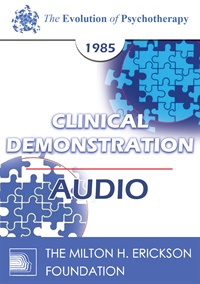
- Average Rating:
- Not yet rated
- Topic Areas:
- Clinical Presentations | Borderline | Children and Adolescent Therapy | Passive-Aggressiveness | Confrontation | Psychotherapy
- Categories:
- Evolution of Psychotherapy | Evolution of Psychotherapy 1985
- Faculty:
- James F. Masterson, MD
- Duration:
- 59 Minutes
- Format:
- Audio Only
- Original Program Date:
- Dec 13, 1985
- Short Description:
- Educational Objectives: To describe the adolescent passive-aggressive defense (borderline) To know how to use confrontation to deal with passive-aggressive defenses
- Price:
- $15.00 - Base Price
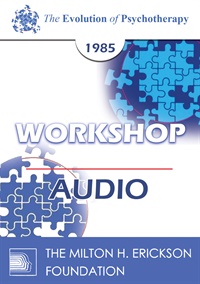
- Average Rating:
- Not yet rated
- Topic Areas:
- Workshops | Transactional Analysis | Borderline | Depression | Phobia | Psychotherapy
- Categories:
- Evolution of Psychotherapy | Evolution of Psychotherapy 1985
- Faculty:
- Mary Goulding, MSW
- Duration:
- 2 Hours 38 Minutes
- Format:
- Audio Only
- Original Program Date:
- Dec 14, 1985
- Short Description:
- This workshop will address specific problems: phobias, depression, uses of T.A. with borderline clients, and addictions. Presentation and discussion.
- Price:
- $15.00 - Base Price
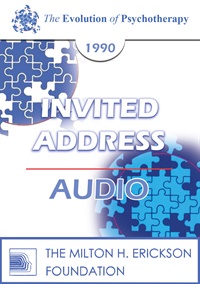
- Average Rating:
- Not yet rated
- Topic Areas:
- Invited Addresses | Borderline | Narcissism | Personality Disorders | Attunement | Therapeutic Relationship | Psychotherapy
- Categories:
- Evolution of Psychotherapy | Evolution of Psychotherapy 1990
- Faculty:
- James F. Masterson, MD | Helen Singer Kaplan, MD, PhD
- Duration:
- 1 Hour 29 Minutes
- Format:
- Audio Only
- Original Program Date:
- Dec 16, 1990
- Short Description:
- The importance of therapeutic alliance is described. Therapeutic alliance, transference, and transference acting-out are defined and distinguished from each other and the therapeutic task of helping the patient to convert transference acting-out to therapeutic alliance and transference is outlined. The differences in the form and content of the intrapsychic structure are described to show why different therapeutic techniques are necessary to establish the therapeutic alliance: Confrontation with the borderline and mirroring interpretation of narcissistic vulnerability with the Narcissistic Personality Disorder. A brief case illustrates each.
- Price:
- $15.00 - Base Price
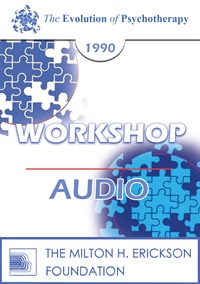
- Average Rating:
- Not yet rated
- Topic Areas:
- Workshops | Narcissism | Personality Disorders | Borderline | Psychotherapy | Supervision
- Categories:
- Evolution of Psychotherapy | Evolution of Psychotherapy 1990
- Faculty:
- James F. Masterson, MD
- Duration:
- 1 Hour 26 Minutes
- Format:
- Audio Only
- Original Program Date:
- Dec 12, 1990
- Short Description:
- This workshop will demonstrate the clinical application of developmental, self and object relations theory to psychotherapy with borderline and narcissistic patients- both shorter and longer term. After brief orienting remarks by Dr. Masterson, the participants will present their clinical material for discussion. This material can vary from single interactions to vignettes to longer presentations. Particular attention will be paid to the role of therapeutic neutrality and countertransference.
- Price:
- $15.00 - Base Price
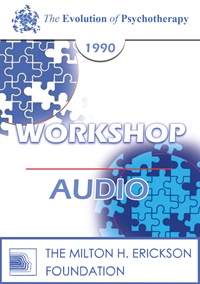
- Average Rating:
- Not yet rated
- Topic Areas:
- Workshops | Borderline | Personality Disorders | Narcissism | Psychotherapy | Supervision
- Categories:
- Evolution of Psychotherapy | Evolution of Psychotherapy 1990
- Faculty:
- James F. Masterson, MD
- Duration:
- 2 Hours 34 Minutes
- Format:
- Audio Only
- Original Program Date:
- Dec 14, 1990
- Short Description:
- This workshop will demonstrate the clinical application of developmental, self, and object relations theory to psychotherapy with borderline and narcissistic patients - both shorter and longer term. After brief orienting remarks by Dr. Masterson, the participants will present their clinical material for discussion. This material can vary from single interactions to vignettes to longer presentations. Particular attention will be paid to the role of therapeutic neutrality and countertransference. This is a repeat offering of Wednesday's workshop.
- Price:
- $15.00 - Base Price
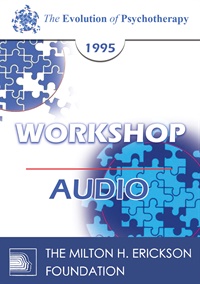
- Average Rating:
- Not yet rated
- Topic Areas:
- Workshops | Borderline | Psychotherapy | Personality Disorders
- Categories:
- Evolution of Psychotherapy | Evolution of Psychotherapy 1995
- Faculty:
- Otto Kernberg, MD
- Duration:
- 3 Hours 9 Minutes
- Format:
- Audio Only
- Original Program Date:
- Dec 14, 1995
- Short Description:
- This workshop summarizes the strategy and tactics of psychodynamic psychotherapy with these patients. The role of interpretation, transference analysis, technical neutrality and countertransferenece will be emphasized. Specific technical approaches will be summarized, particularly contract setting, management of suicidal threats, paranoid regression and dishonesty in patients' communication. Finally, supportive psychotherapy with those patients who cannot be treated with an exploratory approach will be outlined.
- Price:
- $15.00 - Base Price
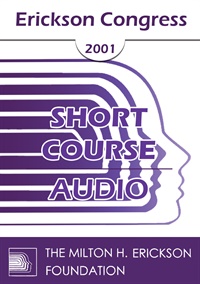
- Average Rating:
- Not yet rated
- Topic Areas:
- Short Courses | Borderline | Ericksonian Hypnosis and Therapy Techniques | Hypnosis | Addiction
- Categories:
- Erickson Congress 2001 | Erickson Congress
- Faculty:
- Ilana Oren, Ph.D., Sc.D., LMFT
- Duration:
- 1:27:05
- Format:
- Audio Only
- Original Program Date:
- Dec 06, 2001
- Short Description:
- IC01 Short Course 07 - The Use of Ericksonian Hypnosis in the Treatment of Borderlines and Addictions - IIana H. Oren, PhD Borderline personality is an underlying character structure, marked by a fragmented sense of identity and maladaptive patterns of perceiving, behaving and relating to others. The Borderline is stuck in "yes, but!" or "I hate you! Don't leave me!" stance. In order to get the habitually oppositional patient to respond, the therapist needs to structure the therapeutic messages in a way that they are not easily recognized on a conscious level. Ericksonian hypnosis paves the way.
- Price:
- $15.00 - Base Price
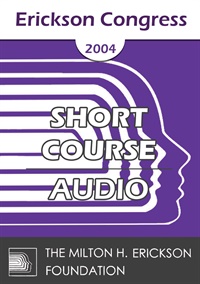
- Average Rating:
- Not yet rated
- Topic Areas:
- Short Courses | Borderline | Hypnosis | Metaphors | Personality Disorders | Relationships | Ericksonian Hypnosis and Therapy Techniques
- Categories:
- Erickson Congress | Erickson Congress 2004
- Faculty:
- Barbara Freedman, PsyD
- Duration:
- 1:19:45
- Format:
- Audio Only
- Original Program Date:
- Dec 02, 2004
- Short Description:
- There is widespread professional discomfort about entering into a therapeutic relationship with a Borderline patient. This workshop addresses suggested treatment strategies for reducing affective arousal and distress, helping to build tolerance skills and creating a collaborative non- threatening atmosphere in which the patient can learn to problem-solve and take healthy risks. A beginner's overview of Ericksonian hypnosis will be included.
- Price:
- $15.00 - Base Price
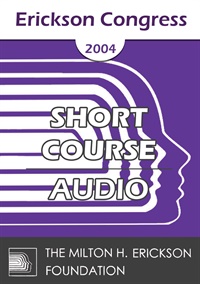
- Average Rating:
- Not yet rated
- Topic Areas:
- Short Courses | Borderline | Eating Disorders | Ericksonian Hypnosis and Therapy Techniques | Hypnosis | Personality Disorders | Addiction | Utilization
- Categories:
- Erickson Congress | Erickson Congress 2004
- Faculty:
- Ilana Oren, Ph.D., Sc.D., LMFT
- Duration:
- 1:19:45
- Format:
- Audio Only
- Original Program Date:
- Dec 02, 2004
- Short Description:
- Have you worked with the patient who one day idealized you and next devalued your skills? The Borderline, who finds refuge in food addiction. Borderline personality is an underlying character structure, marked by a fragmented sense of identity and maladaptive patterns of perceiving, behaving and relating to others. Food provides a soothing antidote to feeling of shame, betrayal and the longing for a positive mother. Ericksonian hypnosis paves the way to reach the habitually oppositional patient.
- Price:
- $15.00 - Base Price

- Average Rating:
- Not yet rated
- Topic Areas:
- Addiction | Short Courses | Borderline | Eating Disorders | Ericksonian Hypnosis and Therapy Techniques | Personality Disorders
- Categories:
- Erickson Congress | Erickson Congress 2011
- Faculty:
- Ilana Oren, Ph.D., Sc.D., LMFT
- Duration:
- 1:22:05
- Format:
- Audio Only
- Original Program Date:
- Dec 09, 2011
- Short Description:
- Have you worked with a patient who one day idealized you and the other devalued your skills? The Borderline, who finds refuge in Food Addiction. Borderline personality is an underlying character structure, marked by a fragmented sense of identity and maladaptive patterns of perceiving, behaving and relating to others. Food provides a soothing antidote to feelings of shame, betrayal and the longing for a positive mother. Brief Ericksonian Solutions paved the way to reach the habitually oppositional patient who is addicted to carbohydrates.
- Price:
- $15.00 - Base Price
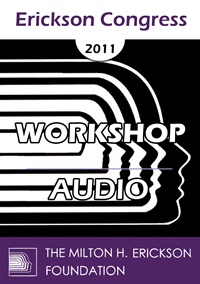
- Average Rating:
- Not yet rated
- Topic Areas:
- Hypnosis | Workshops | Bipolar | Borderline | Personality Disorders
- Categories:
- Erickson Congress | Erickson Congress 2011
- Faculty:
- Lilian Borges, MA, LPC
- Duration:
- 59 Minutes
- Format:
- Audio Only
- Original Program Date:
- Dec 07, 2011
- Short Description:
- This workshop will describe several hypnotic techniques that can be used in the treatment of patients who have bipolar disorder, borderline personality disorder and psychosis. These techniques will help treatment of emotion regulation, relationship improvement, symptom management, etc, specific for the mentally ill. Cases will illustrate the use of the techniques.
- Price:
- $20.00 - Base Price


